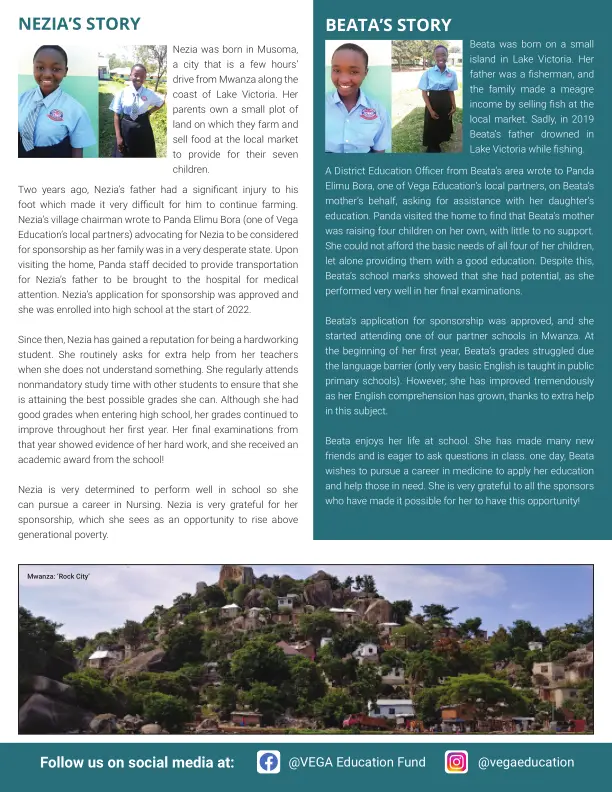
August 2023
Vega Education Fund partners with two on-the-ground charitable organizations in Tanzania, who have experience working with kids and are passionate about education. This allows us to sponsor students from three locations within the country (see map). Vega Education's founders, Leah and Tim Katerberg, helped to start Panda Elimu Bora (which means, in Swahili, "Stepping Up into Better Education") when they were living in Mwanza, Tanzania a few years ago
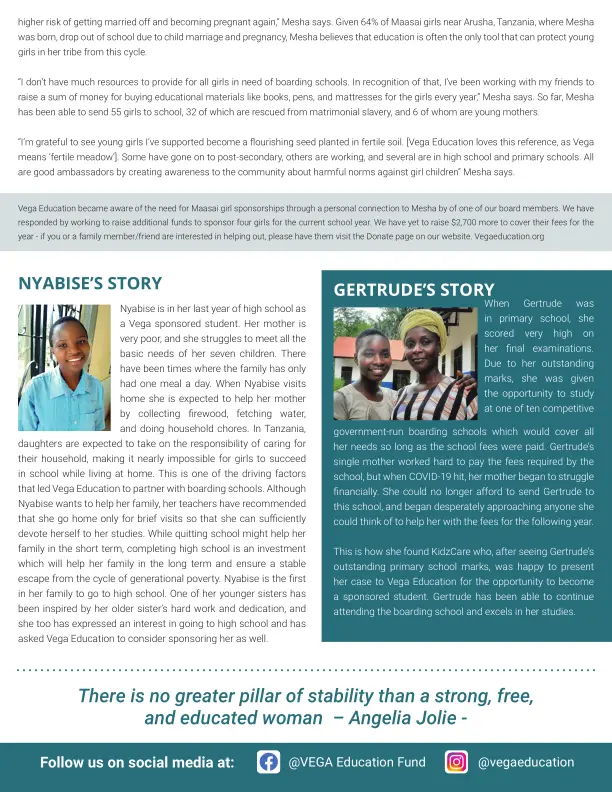
April 2023
In Tanzania, many young girls are robbed of the opportunity to pursue an education. In the Maasai tribe in particular, the practice of 'matrimonial slavery' prohibits most girls from attending school for fear that they may gain independence. Mesha Pius Singolyo, an educated Maasai woman, has been recognized as Tanzania's national Champion for Change in 2022 for her fight against child marriage and for girls' education within her tribe. Mesha made it her goal to help as many young girls out of matrimonial slavery as she could, after she heard of a 12-year-old girl named Sooi who was beaten to death by her father after running away from her 30-year-old husband a few days after their marriage. While Sooi's mother wished for her not to marry, she had no say in the matter. Sooi's father felt it was best for his daughter to be married, and Sooi's mother had no way to help her daughter. This story is not uncommon within the Maasai tribe and the practice of child marriage generally.
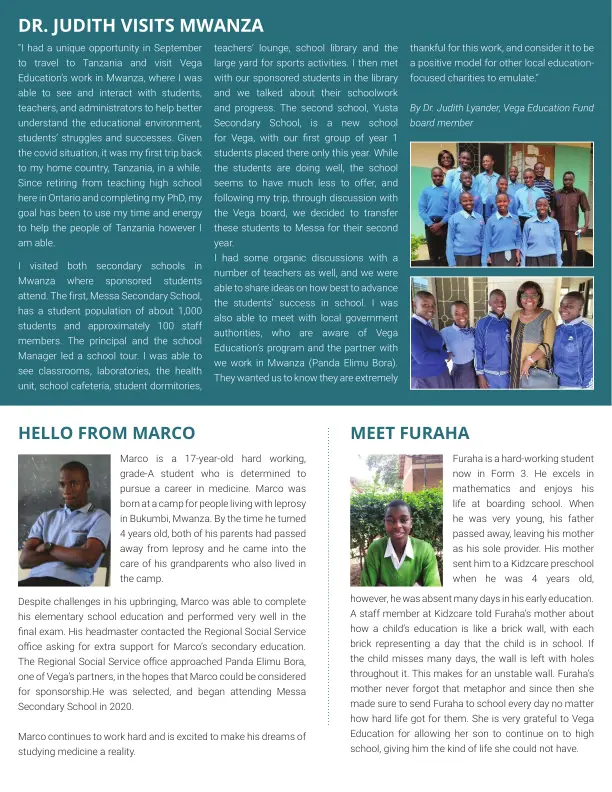
January 2023
The 2023 school year is a very exciting one for Vega Education. That's because it will be our fourth year operating as a charity, which means our first group of sponsored students will be in their last year of high school! We have learned so much since we started, like how to work with local authorities and teachers to ensure the students we select come from poor families and are academically strong; the importance of sending students on a two-month 'intro to high school' course to get them acclimatized and ready for success; the value of encouraging parents to contribute whatever they are able, so they have a stake in their child's success; and the right kind of health insurance our students need so they are fully covered for any type of care and treatment.
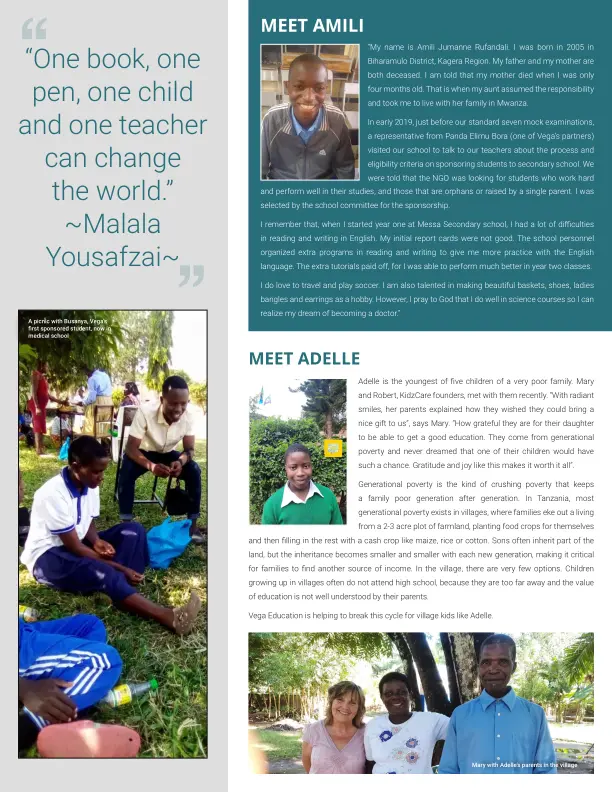
July 2022
I met Robert and Mary Notman in September 2003 while going to school at University of Dar es Salaam in Tanzania. They ran a charity called Friends of Tanzania (now KidzCare – one of Vega Education's partners) which operated a home for orphaned childen in a very poor area of Dar es Salaam. The Notmans believed in these kids and had big plans to build schools, clinics, and nutrition centers to provide everything the orphaned children needed to thrive. I remember wondering how they would ever achieve such big goals but as I continued to volunteer I began to see how hard work and perseverence goes a long way. My faith grew as did my friendship with Robert and Mary. Two years later I completed my degree and had fallen in love with Tanzania. I wanted to stay, so I applied for a paid placement from Canadian University Services Overseas, and convinced them to allow me to be placed with KidzCare! A few days later I was hired as KidzCare's Capacity Building Officer.
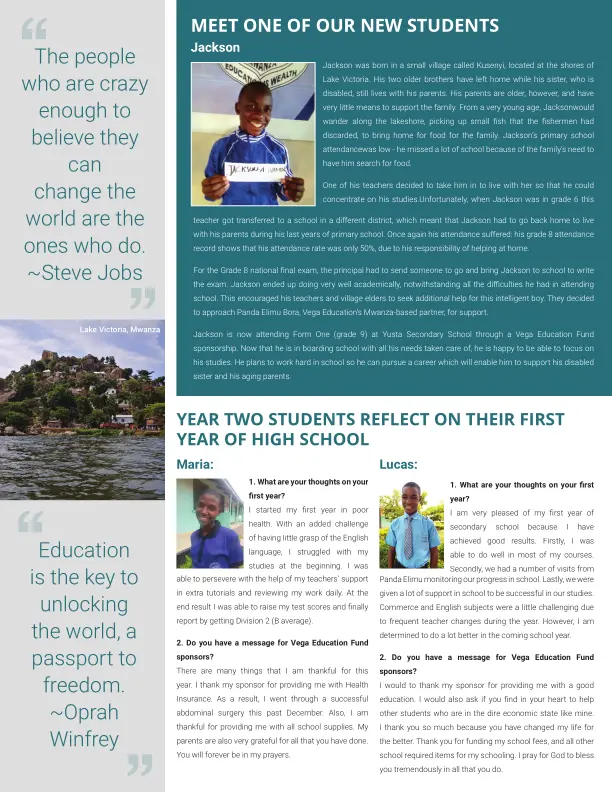
April 2022
Form 2 (Grade 10) National Exam results are in for Vega Education Fund's first cohort of students and they nailed it! These exams are run by the National Examinations Council of Tanzania (NECTA), a government institution that aims to assess the quality of education across the country. Average NECTA scores by school are available to the public, and in fact, these are a key factor in how Vega Education determines secondary schools with which to partner. The score is based on a points system whereby a student's top seven subjects are scored: 1 point for A's, 2 points for B's, 3 points for C's etc. A little counterintuitively, a lower overall score is better. Total scores are then categorized by divisions: Division 1 (7- 17 points), Division 2 (18-21 points) etc. We typically partner with schools whose students consistently rank Division 1 or 2.
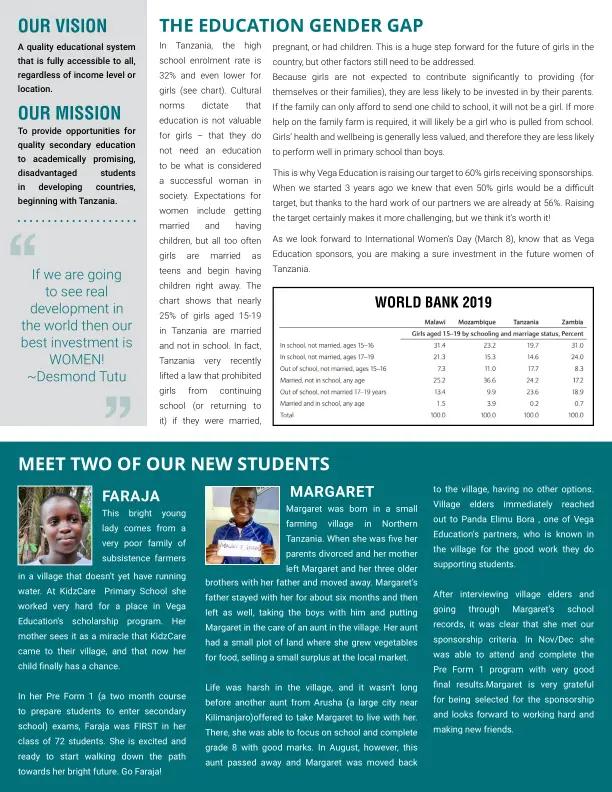
January 2022
As the new Tanzanian school year has just begun, we are happy to announce that we were able to add 11 new students to our total sponsored high school students, for a total of 36! To our new sponsors who made this possible, thank you and welcome! We hope you find these newsletters informative and inspiring as you learn about the lives of these students and the country they live in. While Tanzania is beautiful and has much to offer, a good education is unattainable for the poorest children. Only 32% of kids go to high school, a statistic that largely excludes children from low income families…and girls. Due to cultural norms, girls' education is not prioritized and therefore most girls are bound for a life of poverty, unable to contribute to supporting their families with much needed income.
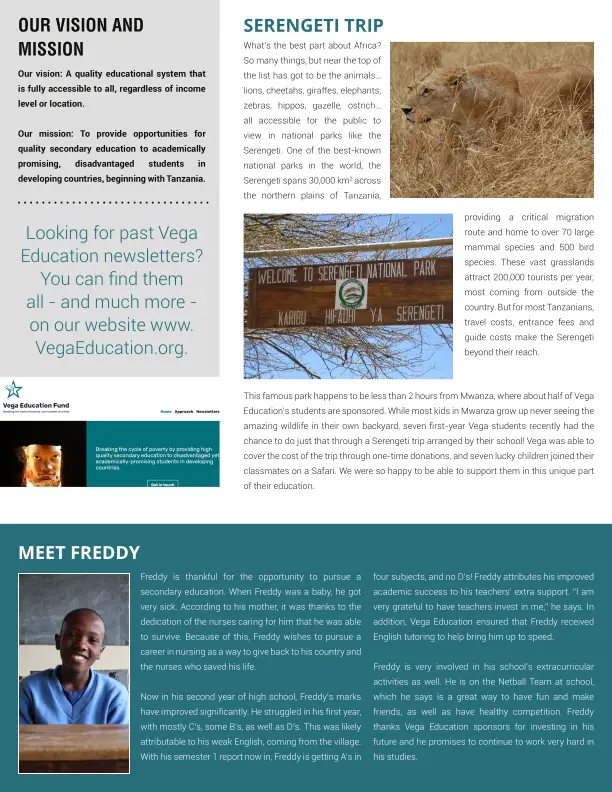
October 2021
As we head into autumn, Tanzania moves into its 'short rains', with temperatures dropping to low twenties in some parts of the country (while remaining at thirty in others). This is certainly the time of year when I think about which warm country I would rather spend the winter in, and Tanzania often tops the list. It has so much to offer, not the least of which is going on a safari in the Serengeti National Park. This is something our Vega Education students in Mwanza had the chance to do recently, which you can read about in this newsletter. The country's short rains will soon bring the wildebeest down from Kenya into the moist grasslands of Tanzania, where they will gorge themselves until calving season (Jan-Feb), spend a few months on the plains while their calves gain strength, and then begin their northern migration in June as the dry season sets in.
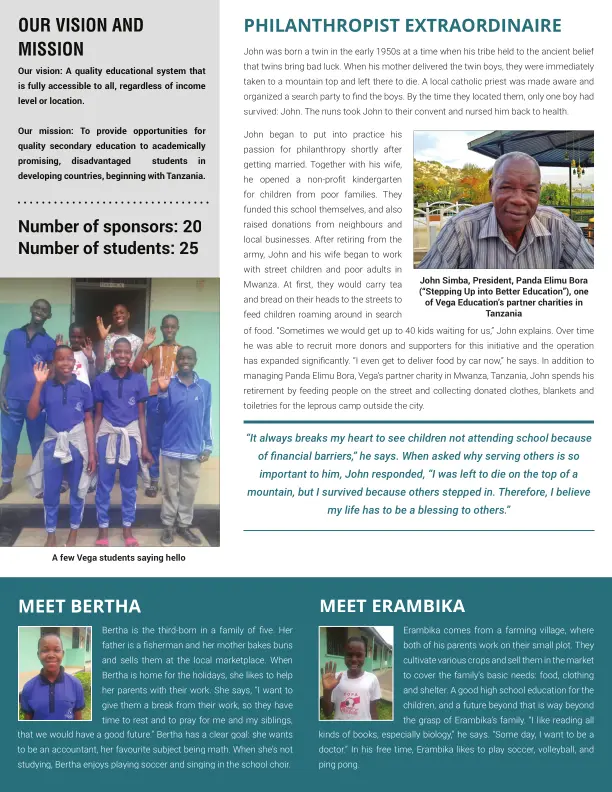
July 2021
The world is truly a smaller place than we think. Over the past year and a half, not being able to travel to Tanzania, the bond I have with this country and the friends I have there has grown only stronger. Social movements over the past months have made me value even more the meaningful relationships Vega Education has with our Tanzanian partners. They are more than partners – they are friends, and truly incredible individuals. You will read about one of them, John Simba, in this newsletter. Our family met John while living in Tanzania and he quickly became our friend. He is probably the kindest-hearted person I know (and I know a few). He's the mentor-type – as soon as you meet him, you can see in his eyes that he has a lot to offer you, that he knows something about love and peace and compassion that you need to learn.
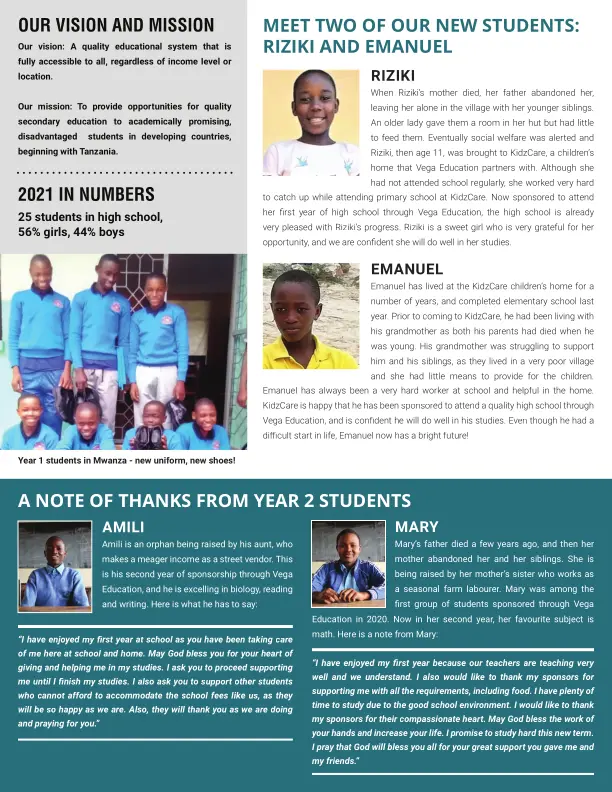
April 2021
With our first year now behind us, and finding ourselves well into our second year, it is time to look back and take stock of the difference we are making for kids in Tanzania. In 2020, eight students completed their first high school year and are now able to speak English, the language of opportunity in Tanzania and around the world. They attended their classes every day in quality uniforms, gym clothes and running shoes, just like all the other kids. They were provided extra tutoring to bring them up to speed in English and other subjects as they needed it. After three more years, they will be able to go to college, apprentice to learn a trade, or complete two additional years school for university preparation if they choose to pursue that path. They will have OPTIONS. In Canada we take for granted the options we have simply because we live here. In Tanzania, the large majority of the population subsists.